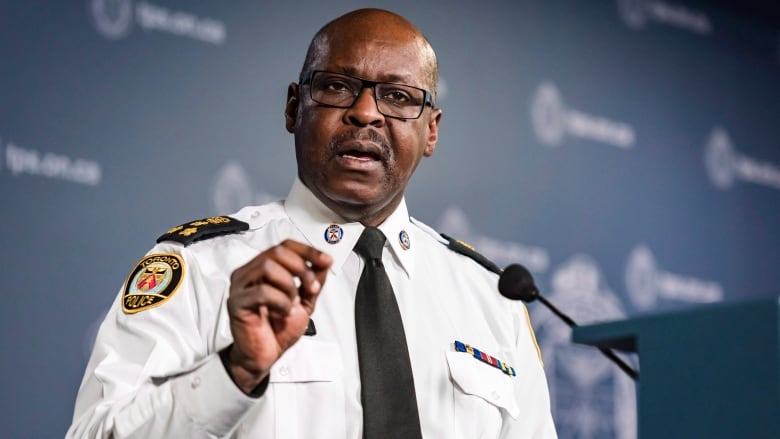Toronto police chief calls 2018 'a year like no other' as fatalities set record
Mark Saunders says police must improve relations with all communities to bring homicide numbers down

Toronto police Chief Mark Saunders says 2018 was "incredibly busy" for the department because so many people lost their lives, but he expects 2019 to be different.
Speaking to reporters at police headquarters on Thursday morning, Saunders said the past year was "unique" because of the van attack in April and the Danforth shooting in July. The two mass casualty events helped to push the homicide rate to a record level, he said.
"This is a year like no other year," Saunders said during a year-end news conference. "This was a unique year. I'm certainly not looking for another year like that in the foreseeable future."
There have been 96 homicides in Toronto this year. The previous record for the most in a single year was 89 set in 1991.
"I'm not looking at an upward trend. I think this was a unique year where there was a lot of loss of life. I do believe that next year will be a different year."

Saunders said the year was challenging not only because of high-profile events that led to complex investigations, including the arrest of alleged serial killer Bruce McArthur, but also because of the demands of daily policing across the city.
This past year, he noted, there have been more shootings and gun seizures, particularly of handguns, than in most previous years. He said there has been an increase in major crime indicators.
The force, however, is hiring more police officers, special constables, auxiliaries and communication call-takers, and those additional people should make a difference, he said.
He said the force also hopes to improve its relationship with all communities in Toronto.
'No magic pill solution' to gun violence, chief says
"When we look at gunplay, there is no magic-pill solution," he said.

"We have to develop stronger community relationships with all segments of our community if we are going to get it right."
Bringing the homicide numbers down means rebuilding trust and restoring accountability, he said.
What is needed is "smarter policing" to prevent young men from picking up guns, analysis of the root causes of gun violence, and working in partnership with communities, he said.
"Developing the relationship piece is what's critical," he said. "Every day, we're seeing more guns. That's one aspect that has to be looked at. The second piece is what's motivating people to use a gun to resolve issues."
The vast majority of crimes are called into the police, he said. "If the community doesn't call, we can't solve crimes," he added. "Getting intelligence to deal with local issues, I think, is the way we need to go in order to get this right."
A total of 514 handguns were seized in 2018, he said. That was 222 more than in 2017 and 172 more than in 2016.
Most of the gun violence in Toronto is related to street gangs, and most people getting shot are living high-risk lifestyles and are associated with street gangs, he said.
"You will never see an urban city that will have zero shootings and zero homicides," he said.
Gun violence, along with modernization of the force, will continue to be a major priority for the police next year, he said.

As for the Bruce McArthur investigation, Saunders said there were "a lot of lessons learned" from the case, and that led to the establishment of a missing persons unit.
"We knew that something stunk," he said.
Police added "high-level resources" to the investigation before McArthur was finally arrested, he said.
The trial of alleged serial killer Bruce McArthur is scheduled to begin on Jan. 6, 2020. He currently stands accused of eight counts of first-degree murder.
Police service continues to modernize
In a brief overview of the year, Saunders said the force implemented a number of changes this year as it continued to modernize.
It consolidated units, introduced new shift schedules, changed how it responds to calls for help such as for gas station thefts and parking complaints, deployed kits with Naxolone (a drug that temporarily reverses an opioid overdose) to many front-line officers, and expanded a neighbourhood officer pilot program.

Saunders also praised the individual "outstanding" work of officers across the city.
"They rescued people from drowning in an elevator. They've prevented suicides. They rescued people and pets from freezing water. They brought shoes to homeless people. They supported families by purchasing groceries. They walked into gunfights, knife fights, saved lives and continue to arrest when necessary."
Public 'stung' by 2 mass casualty events
But he said gun violence continues to be a challenge, because the number of the guns coming into the city, and the police cannot "arrest our way out" of the problem.
He noted that the public perception of safety has changed in Toronto because of the van attack on Yonge Street in North York on April 23 and the Danforth shooting on July 22, but stressed that the city, as a large urban centre, continues to be safe.
"The general public really felt stung by the two mass casualties, back to back," he said.